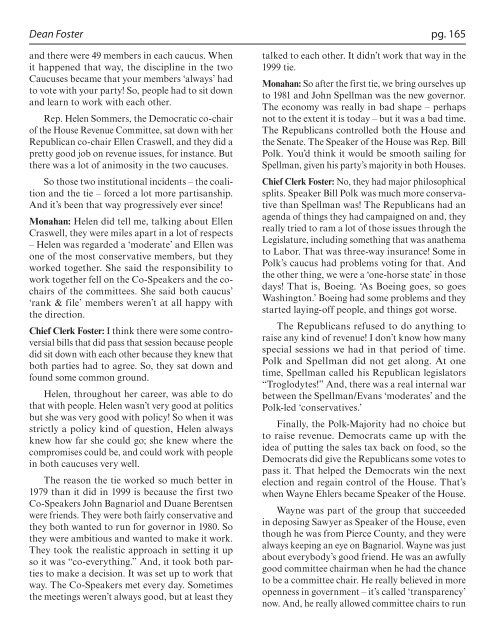Helen Sommers: An Oral History
Helen Sommers: An Oral History
Helen Sommers: An Oral History
Create successful ePaper yourself
Turn your PDF publications into a flip-book with our unique Google optimized e-Paper software.
Dean Foster<br />
and there were 49 members in each caucus. When<br />
it happened that way, the discipline in the two<br />
Caucuses became that your members ‘always’ had<br />
to vote with your party! So, people had to sit down<br />
and learn to work with each other.<br />
Rep. <strong>Helen</strong> <strong>Sommers</strong>, the Democratic co-chair<br />
of the House Revenue Committee, sat down with her<br />
Republican co-chair Ellen Craswell, and they did a<br />
pretty good job on revenue issues, for instance. But<br />
there was a lot of animosity in the two caucuses.<br />
So those two institutional incidents – the coalition<br />
and the tie – forced a lot more partisanship.<br />
<strong>An</strong>d it’s been that way progressively ever since!<br />
Monahan: <strong>Helen</strong> did tell me, talking about Ellen<br />
Craswell, they were miles apart in a lot of respects<br />
– <strong>Helen</strong> was regarded a ‘moderate’ and Ellen was<br />
one of the most conservative members, but they<br />
worked together. She said the responsibility to<br />
work together fell on the Co-Speakers and the cochairs<br />
of the committees. She said both caucus’<br />
‘rank & file’ members weren’t at all happy with<br />
the direction.<br />
Chief Clerk Foster: I think there were some controversial<br />
bills that did pass that session because people<br />
did sit down with each other because they knew that<br />
both parties had to agree. So, they sat down and<br />
found some common ground.<br />
<strong>Helen</strong>, throughout her career, was able to do<br />
that with people. <strong>Helen</strong> wasn’t very good at politics<br />
but she was very good with policy! So when it was<br />
strictly a policy kind of question, <strong>Helen</strong> always<br />
knew how far she could go; she knew where the<br />
compromises could be, and could work with people<br />
in both caucuses very well.<br />
The reason the tie worked so much better in<br />
1979 than it did in 1999 is because the first two<br />
Co-Speakers John Bagnariol and Duane Berentsen<br />
were friends. They were both fairly conservative and<br />
they both wanted to run for governor in 1980. So<br />
they were ambitious and wanted to make it work.<br />
They took the realistic approach in setting it up<br />
so it was “co-everything.” <strong>An</strong>d, it took both parties<br />
to make a decision. It was set up to work that<br />
way. The Co-Speakers met every day. Sometimes<br />
the meetings weren’t always good, but at least they<br />
pg. 165<br />
talked to each other. It didn’t work that way in the<br />
1999 tie.<br />
Monahan: So after the first tie, we bring ourselves up<br />
to 1981 and John Spellman was the new governor.<br />
The economy was really in bad shape – perhaps<br />
not to the extent it is today – but it was a bad time.<br />
The Republicans controlled both the House and<br />
the Senate. The Speaker of the House was Rep. Bill<br />
Polk. You’d think it would be smooth sailing for<br />
Spellman, given his party’s majority in both Houses.<br />
Chief Clerk Foster: No, they had major philosophical<br />
splits. Speaker Bill Polk was much more conservative<br />
than Spellman was! The Republicans had an<br />
agenda of things they had campaigned on and, they<br />
really tried to ram a lot of those issues through the<br />
Legislature, including something that was anathema<br />
to Labor. That was three-way insurance! Some in<br />
Polk’s caucus had problems voting for that. <strong>An</strong>d<br />
the other thing, we were a ‘one-horse state’ in those<br />
days! That is, Boeing. ‘As Boeing goes, so goes<br />
Washington.’ Boeing had some problems and they<br />
started laying-off people, and things got worse.<br />
The Republicans refused to do anything to<br />
raise any kind of revenue! I don’t know how many<br />
special sessions we had in that period of time.<br />
Polk and Spellman did not get along. At one<br />
time, Spellman called his Republican legislators<br />
“Troglodytes!” <strong>An</strong>d, there was a real internal war<br />
between the Spellman/Evans ‘moderates’ and the<br />
Polk-led ‘conservatives.’<br />
Finally, the Polk-Majority had no choice but<br />
to raise revenue. Democrats came up with the<br />
idea of putting the sales tax back on food, so the<br />
Democrats did give the Republicans some votes to<br />
pass it. That helped the Democrats win the next<br />
election and regain control of the House. That’s<br />
when Wayne Ehlers became Speaker of the House.<br />
Wayne was part of the group that succeeded<br />
in deposing Sawyer as Speaker of the House, even<br />
though he was from Pierce County, and they were<br />
always keeping an eye on Bagnariol. Wayne was just<br />
about everybody’s good friend. He was an awfully<br />
good committee chairman when he had the chance<br />
to be a committee chair. He really believed in more<br />
openness in government – it’s called ‘transparency’<br />
now. <strong>An</strong>d, he really allowed committee chairs to run
















